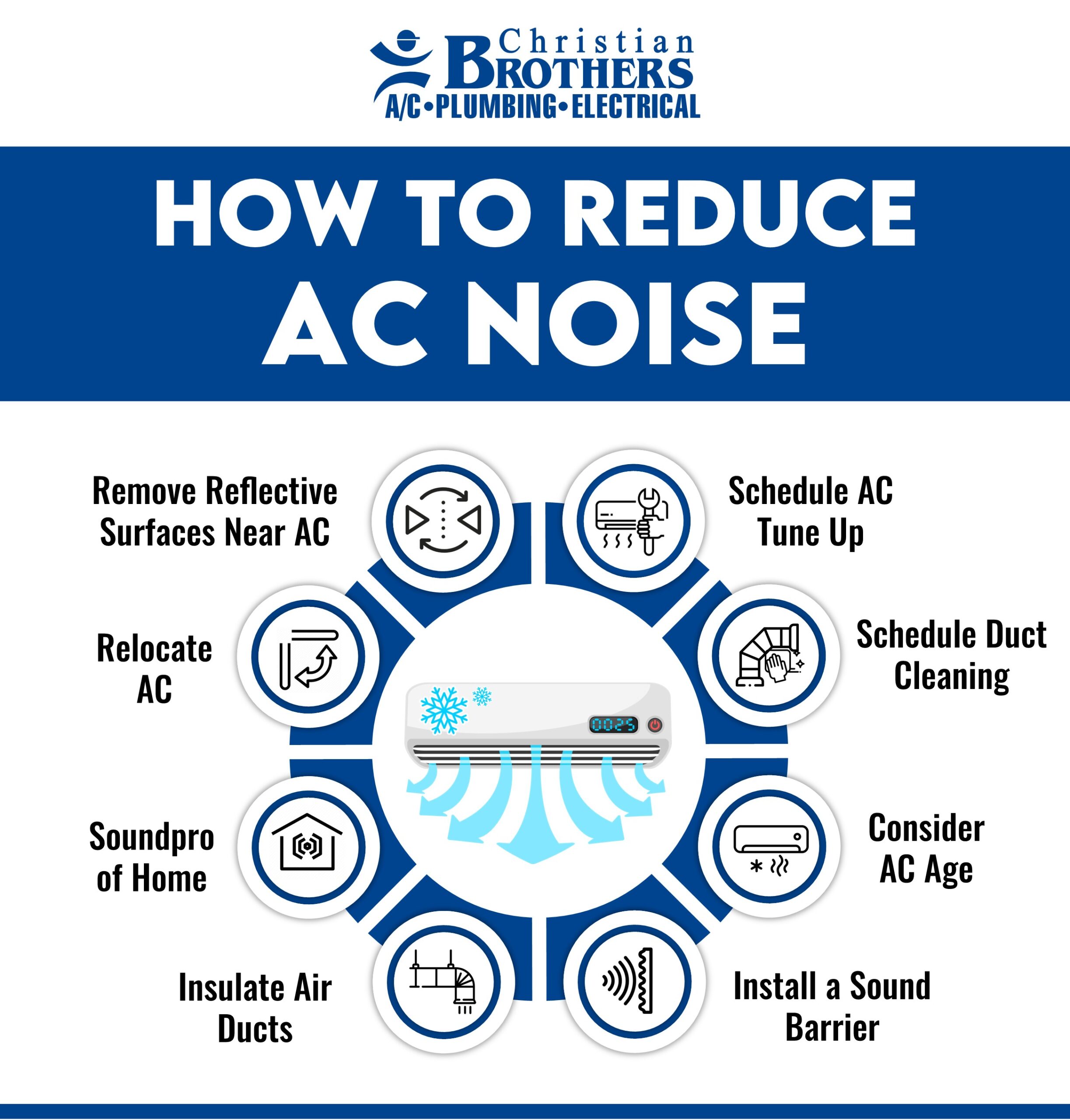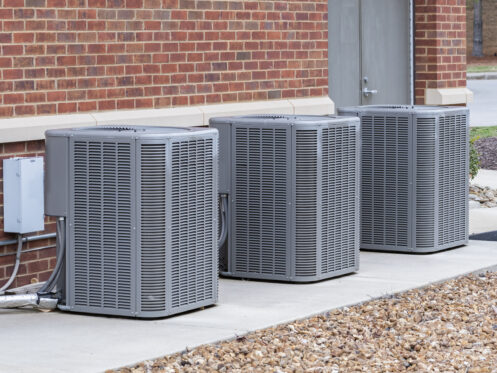The air conditioner in your Glendale home shouldn’t keep you up at night. If you’re frequently bothered by loud rattling or rumbling noises when your cooling system is running, there’s likely a significant issue at play. Fortunately, there are many ways to quiet this unwanted clamor and still enjoy the comforting breeze of a high-functioning AC. The following are eight of them.
1. Have Your Air Conditioner Tuned up or Repaired
Before you take steps to mute your air conditioner, it’s important to find out why it’s making strange and disruptive sounds. The sudden development of loud noises may be an indication of mechanical problems. For instance, there might be:
- Something stuck on one of the AC fan blades
- Excess debris on the HVAC air filter or other airflow obstructions
- Too much refrigerant
- A refrigerant leak
Your air conditioner should have its filter inspected monthly and changed every one to three months. It should receive yearly service from a licensed HVAC company and timely repairs when even the most minor problems arise. If you’ve been negligent in any of these areas, this could be why your air conditioner is trumpeting out complaints. Scheduling AC tune up service will allow our team to identify the root cause of excess noise and resolve it.
2. Schedule HVAC Air Duct Cleaning
When it comes to eliminating air conditioner problems that cause louder-than-normal noise, you can’t forget your HVAC air ducts. Aging, ragged ductwork can lie at the heart of some fairly loud and annoying AC sounds too, including flapping, rattling, and buzzing. By inhibiting airflow, air duct blockages also cause system stress. If left unchecked, this stress could result in overheating, short cycling, and increasingly noisy operation. A duct cleaning service from our techs could help.
When scheduling air conditioner maintenance, have your ductwork inspected as well. Unlike air conditioners that work hard throughout the summer, HVAC air ducts are in action all year long. These annual inspections are especially important if you recently had or currently have a pest problem in any area. Air ducts are a preferred hiding place for many insects and animals given that they’re enclosed, reasonably cool, and dark. If you’ve been hearing scratching and clawing noises whenever your AC is first turned on, it could be the tiny paws of rodents or raccoons rather than the air conditioner itself.
To keep your HVAC air ducts free of blockages, pests, and harmful allergens and contaminants, have your ductwork cleaned every two to three years.
3. Consider the Age of Your AC
You might recall a time when your current air conditioner offered whisper-quiet operation. When fresh out of the box and newly installed, modern air conditioners can be all but impossible to hear. Sadly, this is guaranteed to change over time. There are a multitude of reasons why heating and cooling equipment gets louder as it grows older. Although worn and damaged parts are diligently swapped out during HVAC tune-up services, some aging structures always remain. As bolts and screws are gradually stripped by the forceful movement of air, rattling, whirring, banging, and clunking sounds become inevitable. While loose components can always be tightened, with age, they won’t remain that way for long.
The average lifespan of an air conditioner is about 15 to 25 years. If yours has already reached or passed the end of its expected lifespan, the best way to limit unwanted sounds is by replacing it. With most ACs losing about half of their efficiency after just one decade of service, this is a project that could pay for itself in ongoing energy savings. It’s also important to note that older air conditioners are far different from the models offered now. New ACs have multiple, built-in, noise-reducing features that enable them to work inconspicuously behind the scenes. By hanging on to an AC that’s already cooled your indoor air for more than 20 years you’re missing out on these and many other cutting-edge innovations.
4. Install a Fence or Other Sound Barrier
Some of the most jarring and disruptive AC noises come from the outdoor condenser unit where heat is released and the condenser fan is constantly in motion. Adding a sound barrier around this component will keep excess noise from making its way indoors. When “soundproofing” your air conditioner, it’s important to remember that AC condensers require at least two feet of clearance on all sides. In fact, some AC manufacturers recommend giving these units as much as three feet of clearance. To avoid blocking airflow and unintentionally causing problems with overheating, it’s best to let a licensed HVAC company handle AC soundproofing for you.
Among some of the most popular options in AC soundproofing are:
- Sound blankets
- Perimeter fences
- Acoustic caulk at window exteriors
- Mass-loaded vinyl (MLV) barriers
If your air conditioner is getting along in age, be sure to compare the costs of soundproofing to the costs of AC replacement while additionally considering the hassles of making semi-permanent to permanent changes to your home or yard.
5. Insulate Your HVAC Air Ducts
If there are portions of your home that aren’t serviced by your AC system, they likely have exposed ducting. Exposed HVAC air ducts are typically found in basements, garages, attics, and other remote areas. Given that the temperature in these spaces is naturally warmer than other parts of the building, exposed ducting is warmer as well. When first you turn your AC on and cold air comes rushing through your ducts, these structures will expand and contract in response to rapid temperature changes. Moreover, they won’t do so quietly.
6. Soundproof Your House
If you don’t have enough room in your back or side yard to give your AC condenser adequate clearance when installing a fence or other sound barrier, consider soundproofing your home instead. Just as MLV barriers can be installed directly on AC units, you can also place them in exterior walls. If your AC condenser is right by your bedroom window, it may be beneficial to upgrade your windows too. Triple-pane and quadruple-pane windows block far more noise than double-pane options do. If you have noise coming from the closet or other storage area that houses your air conditioner’s air handler, add quality soundproofing materials here.
7. Relocate Your AC
Relocating a noisy air conditioner is a major job, but it may be a worthwhile choice when scheduling AC replacement. Don’t count on a new AC condenser to provide two decades of noiseless service and position it right where your old condenser was. Instead, mention your noise concerns to the HVAC technician in charge of your project to find the best installation strategies for mitigating them.
8. Get Rid of All Reflective Surfaces in Your Air Conditioner’s Vicinity
One simple strategy for reducing noise from outdoor condensers is to remove all flat, reflective surfaces right near these units. You may have a freestanding item next to your AC that’s constantly reflecting sound waves and amplifying them. Making slight modifications to your outdoor decor could have a major impact on how much operational noise you ultimately hear.
Noise Reduction Tips for AC Units
Since 1976, we’ve been proudly serving residents of Glendale, AZ, and the surrounding area. Our clients can count on us for superior heating, cooling, plumbing, and electrical services. We also provide innovative indoor air quality solutions, duct repairs, and insulation. To find out why your air conditioner is making loud noises or to schedule an AC service, contact Christian Brothers Air Conditioning Plumbing Electrical today.











